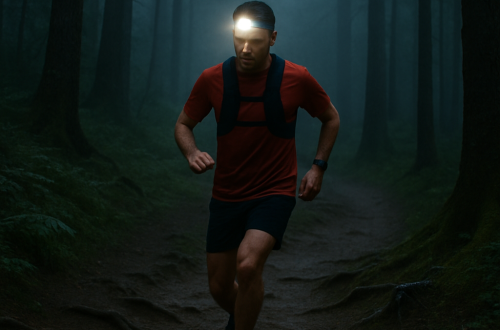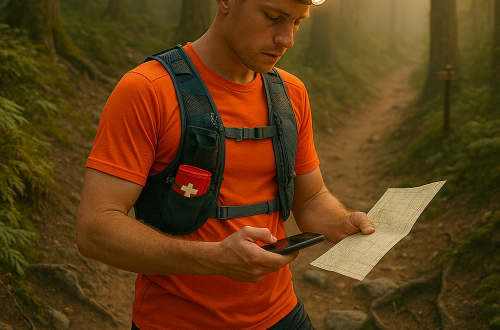
What should I do if I get lost on a trail run?
How to Recognize You’re Lost on a Trail Run
It happens to even the most experienced trail runners — one wrong turn, a missed marker, or a moment of distraction, and suddenly the trail doesn’t look familiar. Recognizing that you’re lost early is the first step to getting back safely. If you’ve been running longer than expected, can’t find trail markers, or the terrain looks unfamiliar, it’s time to stop and reassess.
What should I do immediately if I realize I’m lost on a trail run?
First and foremost: stop moving. It’s tempting to keep going in hopes of finding the trail, but that often leads you farther off course. Instead, take a few deep breaths and assess your situation. Ask yourself:
- When was the last time I saw a trail marker or familiar landmark?
- Do I have a map, GPS, or phone with signal?
- What direction was I heading before I got off track?
Staying calm is key. Panic clouds judgment and leads to poor decisions. Sit down, hydrate, and think through your next steps logically.
Should I stay put or try to find my way?
This is one of the most important decisions you’ll make. In general, if you’re truly lost and unsure of your location, it’s best to stay put — especially if someone knows your route and is expecting you back. Rescuers will start from your last known location and can find you more easily if you’re stationary.
However, if you have a good sense of direction and believe you can safely retrace your steps, do so cautiously. Mark your path with natural indicators (like stacked rocks or sticks) in case you need to backtrack again.
How can I use natural navigation and landmarks?
Even without a compass or GPS, nature offers clues. The sun rises in the east and sets in the west — this can help you orient yourself. Streams often lead to larger bodies of water or roads. Look for worn paths, broken branches, or footprints that might indicate a trail.
Use prominent landmarks like large rocks, tree formations, or mountain ridges to keep your bearings. If you’ve been taking mental notes during your run, now is the time to recall them.
How to use your phone or GPS device effectively
If you have a smartphone or GPS watch, check your location using offline maps or GPS apps. Apps like Gaia GPS, AllTrails, or even Google Maps (if you downloaded offline areas) can help you pinpoint your position. Turn on airplane mode to conserve battery while still using GPS features.
If you have a signal, send a message or call someone to let them know your situation and location. Share your GPS coordinates if possible.
When and how should I call for help?
If you’re injured, it’s getting dark, or you’ve been lost for more than an hour without progress, it’s time to call for help. Use your phone to contact emergency services. If you’re in a remote area without signal, consider using a satellite communicator like a Garmin inReach or SPOT device — these can send SOS messages even without cell coverage.
When contacting help, provide as much detail as possible: your last known location, your estimated direction of travel, any landmarks nearby, and your physical condition.
What gear helps if I get lost trail running?
Preparation is everything. Here’s a list of essential items that can make a huge difference if you get lost:
- Trail map (paper or downloaded offline)
- Compass or GPS watch
- Fully charged phone + portable battery pack
- Whistle (for signaling)
- Emergency blanket or bivy sack
- Headlamp or flashlight
- Extra water and snacks
- Basic first aid kit
Even on short runs, carrying a few of these items can be a lifesaver.
How to stay calm and mentally focused
Getting lost can trigger anxiety, but staying calm is crucial. Focus on your breathing — inhale slowly through your nose, exhale through your mouth. Remind yourself that you’re prepared and that help is available if needed.
Break your situation into small, manageable decisions. Instead of thinking, “I’m lost,” reframe it as, “I need to figure out where I am and what to do next.” This mindset shift can reduce panic and help you think clearly.
How can I prevent getting lost while trail running?
Prevention starts before you hit the trail. Here are some smart habits to adopt:
- Plan your route: Study the trail map and note key landmarks.
- Tell someone: Always let a friend or family member know your route and expected return time.
- Download offline maps: Cell service can be unreliable in the backcountry.
- Stick to marked trails: Avoid shortcuts or unmarked paths.
- Check the weather: Fog, rain, or snow can obscure trails and landmarks.
Practice situational awareness during your run. Look behind you occasionally — it helps you recognize the trail when retracing your steps.
What if I’m running with a group and we get separated?
Set a regrouping plan before the run.
If separation happens:
-
Stop and wait at the last known junction.
-
Blow your whistle: Three short blasts signal distress.
-
Avoid assuming the group went ahead—they may be circling back for you.
Carlos, a trail leader for a local running club, advises, “We always stop at major intersections. No one moves forward until everyone checks in.”
Should I run with a personal locator beacon or satellite device?
If you run solo or frequent remote trails, yes.
Devices like the Garmin inReach Mini or SPOT Gen4 let you:
-
Share your real-time location
-
Send pre-written check-ins
-
Trigger emergency response without cell service
These aren’t just for multi-day adventures. Even a half-day run on a less-traveled route can justify the peace of mind.
Final Thoughts: Getting Lost Doesn’t Have to Be Dangerous
The question “what to do if lost on a trail run” has a simple answer: pause, breathe, assess, and act with clarity.
Whether it’s a wrong turn or an unexpected trail closure, your gear, mindset, and preparation are your greatest assets. Getting lost is never ideal—but it’s not the end of your story. In fact, many trail runners see it as a rite of passage.
And often, it’s the experience that transforms you from a beginner into someone who knows how to handle the backcountry with calm and confidence.
Powered by: aiContent.live





